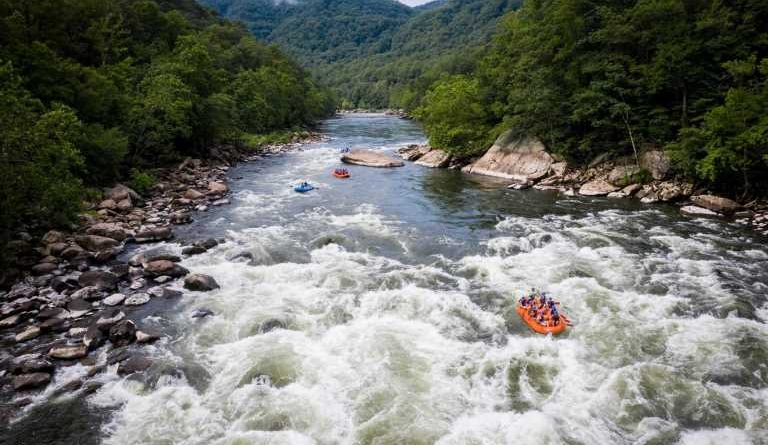America’s newest national park is a haven for hiking, climbing, and rafting
If one major travel trend has emerged over the tumultuous months of the pandemic, it’s been the public’s enormous appetite for getting outdoors.
It’s good timing, then, that in December lawmakers added a new unit to the national park system. Buried under legislation for a federal omnibus spending bill was a law naming New River Gorge National Park and Preserve as the country’s 63rd national park.
Spreading across more than 72,000 acres of wooded hills, deep ravines, and Appalachian plateau in rural West Virginia, New River Gorge offers sweeping views of centuries-old oak and maple forest that stretch for miles along steep sandstone cliffs. Along with its stunning topography, its vast array of socially distanced outdoor activities—rafting, rock climbing, hiking, mountain biking—make it a pandemic-era destination par excellence.
Seizing the moment
Heading into the second summer of the coronavirus pandemic, the appeal of safe, outdoor activities is clear. Across the U.S., demand for RVs, bikes, ski equipment, and campgrounds has rocketed; so has the number of people taking to the country’s trails. Many national parks—both the perennially popular, big-name spots and the lesser-known parks—saw a significant rise in visitors last year.
Load Error
As crowds swell on public lands, visitors learn how to minimize their impact.
Attaining national park status normally brings a bevy of headlines, attention, and new visitors. For some newly named parks, that’s led to challenges. Places such as Indiana Dunes National Park on the shores of Lake Michigan and the Gateway Arch in St. Louis have had to manage big crowds and a lack of resources.
Whereas many places gaining national park status have struggled with the ensuing crowds, New River Gorge looks well-placed to handle the throngs.
Located 300 miles from Washington, D.C. and a three-plus-hour drive to the nearest major city, New River Gorge won’t likely face the surge of day-trippers common at parks (like Indiana Dunes and Gateway Arch) that are closer to major urban centers. While some estimates point to a 20 percent increase from last year’s one million visitors (a figure that’s remained steady since the early 1990s), the park is expansive.
At New River Gorge, “there is not one standard entry-and-exit point. Travelers who visit will not have to sit in a long line just to get in,” says West Virginia Tourism Commissioner Chelsea Ruby. “It’s almost as if the park has natural crowd-control built from within, given its accessibility and expanse.” The establishing legislation included a facility to buy 100 acres of land for parking lots, plus an additional 3,700 acres if needed.
Video: Under-the-Radar Alaskan National Parks With Wild Scenery and Incredible Adventures (Travel + Leisure)
Air New Zealand to Test Out Digital Health Passport on Its Auckland-Sydney Route
Travel + Leisure
This Palm Beach Hotel Has a Book Butler to Curate Your Perfect Literary Escape
Travel + Leisure
Diet Prada’s New Neon Signs Are Inspired by the Fashion Capitals of the World
Travel + Leisure
You Can Buy Out This Entire Private Island in the Maldives for $250,000 a Night
Travel + Leisure
UK Announces Dates to Lift Restrictions on Dining, Travel, and Nightclubs
Travel + Leisure
NASA's Perseverance Rover Is Tweeting From Mars and It's Both Hilarious and Educational
Travel + Leisure
TSA to Hire 6,000 Officers Ahead of Predicted Summer Travel Surge
Travel + Leisure
This Famous Abbey Road Sign Is Up for Auction in London — and Beatles Fans Are Bidding Hig
Travel + Leisure
Snowmobiles, Quiet Streets, and Stellar Sunsets: What Life Is Like on Michigan's Mackinac
Travel + Leisure
Hang With Elephants Then Hit the Pool on This $25,000 Safari in Botswana
Travel + Leisure
London's Natural History Museum Unveils a Massive Replica of Mars
Travel + Leisure
Disney World Will Celebrate Its 50th Anniversary This Fall
Travel + Leisure
You Could Get a Major Discount on Your Next Vacation Just by Agreeing to 'Unplug'
Travel + Leisure
Explore the Country on These 49 New ‘All-American Roads’ and Scenic Byways
Travel + Leisure
The Louvre Is Undergoing a Major Renovation While Closed Due to the Pandemic
Travel + Leisure
The National Park Service's New App Makes Planning a Visit Easier Than Ever
Travel + Leisure
Air New Zealand to Test Out Digital Health Passport on Its Auckland-Sydney Route
Paste the article dek here
Travel + Leisure
This Palm Beach Hotel Has a Book Butler to Curate Your Perfect Literary Escape
Paste the article dek here
Travel + Leisure
Diet Prada’s New Neon Signs Are Inspired by the Fashion Capitals of the World
COURTESY OF YELLOWPOP
Travel + Leisure
Discover the 10 least visited national parks.
Rafting enthusiasts have been drawn to this pocket of West Virginia for decades. Local outfitters and tourism experts say hotels—as well as cabins and privately run camping areas especially suitable for COVID-19 travel—are already well established (though booking ahead is always recommended). Adventures On The Gorge, one of the largest outdoor adventure resorts in the area, plans to add glamping tents, small RV sites, and campsites to its existing 90 campsites and 362-bed cabin capacity.
What’s more, the stop-start nature of the pandemic-afflicted 2020 season actually proved useful for many in the recreation world. Public health restrictions meant that, after a quiet start to spring and summer, many outfitters experienced a huge swell in late season bookings, says Haynes Mansfield of ACE Adventure Resort. The easing of state restrictions last summer resulted in busier than normal trailheads and parking lots, but the rush served another important purpose. “What that did was give us a lens into the future expected from the (national) park designation,” he says.
A long-awaited boom
For many, this recognition has been a long time coming. Having been added to the National Park System as a national river in 1978, the region has long been regarded as a hidden treasure and a place to come and play.
One such aficionado is Kenny Parker, a member of the New River Alliance of Climbers and co-owner of the Water Stone Outdoors store in Fayetteville. He moved from Virginia in the early 1990s, won over by New River Gorge’s climbing potential.
“This place was bound to be discovered,” he says. “It’s truly one of the outdoor recreational meccas in the United States.”
The area may be best known for rafting, but there’s more on offer than just whitewater. The third Saturday of October sees daredevil BASE jumpers and rappelers leap from the 876-foot-high New River Gorge Bridge, situated at the northern end of park, on Bridge Day. There are also guided walking tours on the underside of the bridge, along a 24-inch-wide gangway running the bridge’s 3,000-foot span (minimum age 8).
Intense adventures aside, local outfitters run boating activities on the upper New River, where calmer stretches are suitable for families with children 6 and older. Junior ranger opportunities are available at visitor centers around the park.
Away from the water, there’s ziplining; a trove of mountain bike trails; and some 1,400 established rock-climbing routes ranging from 30 to 120 feet high, at class 5.9 to 5.12. (Many routes require a high level of skill, and climbing schools are available in the area.) With seventeen stops, the self-guided African American Heritage Auto Tour offers a window into the region’s history.
These people of color transformed U.S. national parks.
Although some visitors may be used to the well-serviced facilities and abundant creature comforts available in many other national parks, New River Gorge’s on-site amenities are simpler. Several locations offer primitive camping inside the park (no hookups or drinking water; scant restroom facilities). Camping on riverside sites can be done without a reservation or fee. Due to COVID-19 restrictions, only three sites—Stone Cliff Beach (seven campsites), Glade Creek (12) and Grandview Sandbar (18)—are currently open, though visitors are advised to check for updates. National Park Service staff say there are no plans to add more campgrounds or other facilities at this time.
Many locals are concerned about careful management of the area, which has one of the lowest population densities east of the Mississippi River and hasn’t experienced large-scale investment for decades.
Kenny Parker says that at the nationally acclaimed 2.4-mile Endless Wall Trail, last year’s parking access was “overflowing.”
While the national park redesignation is a positive for first-time visitors and local businesses alike, some residents are less enthused. Locals who hunt and angle—activities woven into the traditions of families—have voiced opposition to the change.
“One of the big things with this debate was whether it would come with funding to alleviate these growing pains that we’re already having,” Parker says of the conversation over national park status. “Growth is a good thing, if it’s managed.”
Stephen Starr is an Irish journalist and author who reported from the Middle East for a decade before moving to Ohio. Find Stephen on Twitter and Instagram.
Source: Read Full Article





















